Внутрішньо переміщені особи в Куяльнику: переміщення переміщених?
An article by Anastasiia Murzanovska, Desirée C. Schmitt, Kristina Müller, Viktoriia Karpenko.[1]
For Ukrainian language version see below.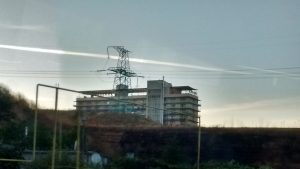
During an International Conference on Migration in Ukraine and Germany in Odessa, our attention was brought to the situation of Internally Displaced Persons (hereinafter IDPs) within Ukraine.
IDPs are “persons or groups of persons who have been forced or obliged to flee or to leave their homes or places of habitual residence, in particular as a result of or in order to avoid the effects of armed conflict, situations of generalized violence, violations of human rights or natural or human-made disasters, and who have not crossed an internationally recognized state border.“[2] Currently there are more than 1.4 million IDPs in Ukraine[3] coming from Crimea and Donetsk and Luhansk Regions.
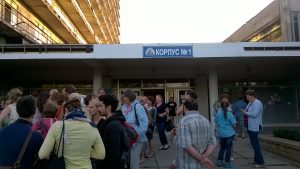 The desperate situation of IDPs became clear to us when visiting the approximately 400 IDPs (among them around 70 minors) living in Kuyalnik in the outskirts of Odessa for about two years now. When we arrived at the venue roughly 80 inhabitants were already waiting outside keen to share their plight.
The desperate situation of IDPs became clear to us when visiting the approximately 400 IDPs (among them around 70 minors) living in Kuyalnik in the outskirts of Odessa for about two years now. When we arrived at the venue roughly 80 inhabitants were already waiting outside keen to share their plight.
The situation may be described as follows: The state-owned building, although quite dilapidated, technically is still a sanatorium but at the moment used as an accommodation for IDPs. As public funding never reached the administration, huge deficits accumulated. We were told that, as a consequence, the administrator decided to charge maintenance (electricity, heating, water) and nutrition fees (1€/lunch and 1€/dinner, no breakfast available). However, some of the inhabitants were not able or willing to pay these costs given the low amount of social benefits they are entitled to (around 80€/month)[4]. As a consequence, it was decided to shut the accommodation and evict the building by the 1st of October 2016. Alternative accommodation has been proposed in small villages in rural areas; an inacceptable solution for the significant part of inhabitants being mentally and/or physically disabled as their needs for special medical and psychological treatment cannot be met there. Likewise, appropriate schooling will not be provided in the periphery.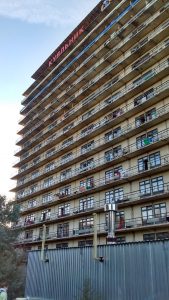
From the 20th of September electricity, water and heat supply will be cut off completely. Certain inhabitants have already been deprived of these services in order to apply pressure and make them leave. The mother of a disabled child being afraid of the dark expressed her grief that she cannot alleviate the suffering of her daughter by simply turning on the light. Several inhabitants reported about the removal of furniture and refrigerators from their rooms against their will.
All attempts of the Kuyalnik IDPs and NGOs to receive help from the Ukrainian Government, in particular from the Ministry of Social Policy, and Head of Odessa Region Administration (Mikheil Saakashvili) were of no avail.
UNHCR is currently trying to find housing in Odessa for the most vulnerable persons living in Kuyalnik. The able-bodied will probably have to move to the rural villages where “ghetto-building” likely to occur (again).
Not being experts in the field of IDP protection and lacking all relevant information it is our aim to draw international attention to a matter that has been hotly discussed within Ukraine during the last months and that should not be forgotten by the international community.
————————————————
[1] Anastasiia Murzanovska and Viktoriia Karpenko are PhD candidates at the National University “Odessa Law Academy”; Dipl-Jur. Desirée C. Schmitt, LL.M. and Ass. iur. Kristina Müller are PhD candidates at the Saarland University, Europa-Institut, and research associate at the chair of Prof. Dr. Thomas Giegerich, LL.M. for EU Law, Public International Law and Public Law. All expressed opinions are personal views of the authors.
[2] UNHCR Ukraine, Internally Displaced Persons, 17 September 2016, available at http://unhcr.org.ua/en/2011-08-26-06-58-56/news-archive/1231-internally-displaced-people (17/09/2016).
[3] UNHCR Ukraine, Internal Displacement Map, data as of 14 August 2015, available at http://unhcr.org.ua/en/2011-08-26-06-58-56/news-archive/1244-internal-displacement-map (19/09/2016). The number is fluctuating due to instable political and humanitarian situation in the Donetsk and Lugansk Regions and problems of registration.
[4] Out of around 1.4 Million IDPs only 5 % are in living special accommodation, the other part has to find housing on their own, presentation by Dmitriy Plechko, UNHCR Ukraine, 16 September 2016, Odessa. There is a decree of the Cabinet of Minister (http://zakon2.rada.gov.ua/laws/show/505-2014-п) relating to address payments (on requests) for IDPs; the social benefits are dependent on different categories (e.g. retired or disabled persons).
Внутріш ньо переміщені особи в Куяльнику: переміщення переміщених?
Анастасія Мурзановська, Дезіре К. Шмітт, Крістіна Мюллер, Вікторія Карпенко [5]
Під час Міжнародної конференції з питань міграції в Україні та Німеччині, що проходила в Одесі, нашу увагу привернула ситуація внутрішньо переміщених осіб (надалі ВПО) в межах України.
ВПО це «люди або групи людей, які були змушені рятуватися втечею або покинути свої будинки або місця проживання, через або для того, щоб уникнути наслідків збройного конфлікту, ситуації загального насильства, порушень прав людини або стихійних лих/техногенних катастроф, і які не перетнули міжнародно-визнаний державний кордон країни.»[6] На теперішній час в Україні[7] нараховується більше 1.4 мільйони ВПО з Криму, Донецької та Луганської областей.
Особливо відчайдушною здалась ситуація приблизно 400 ВПО (серед них близько 70 неповнолітніх), які проживають на території Куяльнику, що на околиці Одеси, вже протягом двох років. Частиною конференції стало відвідування місця проживання ВПО. Коли ми прибули на місце, близько 80 жителів уже чекали зовні готові поділитися своїм тяжким становищем.
Ситуація може бути описана наступним чином: будівля, що знаходиться у державній власності – досить стара, технічно все ще є санаторієм, але на даний момент використовується в якості тимчасового житла для ВПО. Оскільки державне фінансування ніколи не досягало адміністрації закладу, накопичилась значна заборгованість. Нам було повідомлено, що, як наслідок, директор закладу вирішив стягувати плату за комунальне обслуговування (електро-, тепло- та водопостачання) та харчування (1 € за обід, 1€ за вечерю; сніданки не забезпечуються). Тим не менш, деякі з жителів були не в змозі або не готові сплачувати ці кошти, враховуючи низький розмір соціальної допомоги, яку вони отримують (близько 80€ на місяць)[8]. В результаті, було вирішено закрити санаторій та виселити всіх до 1 жовтня 2016 року. Було запропоновано альтернативні варіанти розміщення в невеликих населених пунктах в сільській місцевості; це є неприйнятним рішенням для значної частини жителів, які мають обмежені розумові чи фізичні можливості, оскільки їхні потреби в спеціальний медичній та психологічній допомозі не можуть бути задоволені там. Так само, належна шкільна освіта не може бути надана в провінції.
З 20 вересня електроенергія, водо- і теплопостачання буде відрізане повністю. Деякі жителі вже позбавлені цих послуг для чинення тиску та змусити їх залишити санаторій. Мати дитини-інваліда, яка боїться темряви, висловила свій розпач, що вона не може полегшити страждання своєї дочки просто увімкнувши світло. Кілька жителів повідомили про вилучення меблів і холодильників зі своїх кімнат проти їх волі.
Всі спроби куяльницьких ВПО та недержавних організацій отримати допомогу від українського уряду, зокрема, від Міністерства соціальної політики, і голови Одеської обласної адміністрації (Міхеіла Саакашвілі) були безрезультатними.
УВКБ ООН на даний час намагається знайти житло в Одесі для найбільш вразливих осіб, які проживають в Куяльнику. Працездатним, ймовірно, доведеться переїжджати в сільську місцевість, дуже вірогідно в «гетто-будівлю» (знову ж).
Ми не є фахівцями в області захисту ВПО та не володіємо всією необхідною інформацією, тим не менш, нашою метою є привернення міжнародної уваги до питання, яке гаряче обговорюється в Україні протягом останніх місяців, і яке не повинно бути забуте міжнародним співтовариством.
————————————————
[5] Анастасія Мурзановська та Вікторія Карпенко є аспірантами Національного університету «Одеська юридична академія»; Dipl-Jur. Дезіре К. Шмітт, LL.M. Ass. iur. Крістіна Мюллер є аспірантами Європейського інституту Саарландського університету та науковими співробітниками кафедри професора д-ра Томаса Гієріха, LL.M., з права Європейського Союзу, публічного міжнародного права та публічного права. Всі висловлені думки є особистими поглядами авторів.
[6] UNHCR Ukraine, Внутрішньо переміщені особи, 17 вересня 2016, доступно за http://unhcr.org.ua/en/2011-08-26-06-58-56/news-archive/1231-internally-displaced-people (17/09/2016).
[7] UNHCR Ukraine, Карта внутрішнього переселення, дані від 14 серпня 2015, доступно за http://unhcr.org.ua/en/2011-08-26-06-58-56/news-archive/1244-internal-displacement-map (19/09/2016). Число коливається в зв’язку з нестабільною політичною і гуманітарною ситуацією в Донецькій і Луганській областях і проблемами реєстрації ВПО.
[8] Із приблизно 1.4 мільйонів ВПО тільки 5 % з них проживають в спеціальних приміщеннях, всі інші повинні знаходити житло власними силами, Дмитро Плечко, представник УВКБ ООН, презентація 16 вересня 2016 р., Одеса. Наразі діє Постанова Кабінету Міністрів України щодо надання адресної допомоги (за заявою) ВПО для покриття витрат на проживання, в тому числі на оплату житлово-комунальних послуг; соціальні виплати направлені на допомогу окремим категоріям (наприклад, пенсіонерам чи непрацездатним особам).

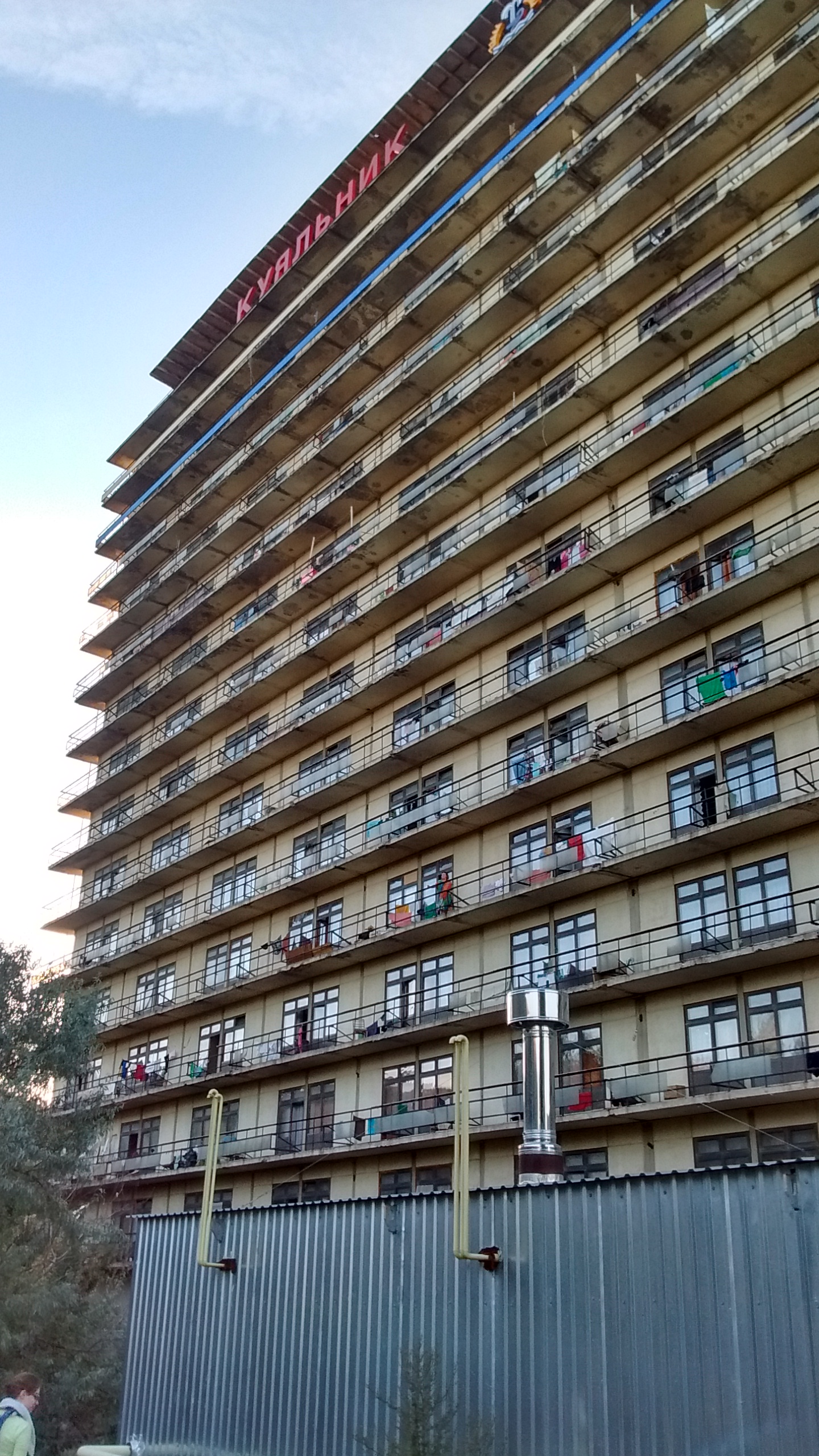


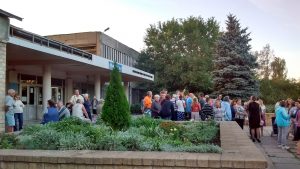

On 22 September NGO „Desyate Kvitnya“ organized a trip to one of the object offered to IDPs as social housing in Odessa region, Podolsk sub-region that is 250 km from Odessa city. 14 IDPs went to observe the object by themselves – it is not suitable for wheelcheir disabled persons – no ramps. What is more, there are no electrical sockets in the rooms where people are offered to be settled.
Some useful links to get updated information on the situation from IDPs themselves (unfortunately they are only in russian, but google translate can cope with that):
Group of IDPs living in Kuyalnik in facebook:
https://www.facebook.com/groups/1518207218431017/?fref=ts
The website of IDP coordinator at Kuyalnik sanatorium – Igor Vaiman
http://scope.delo.ws/